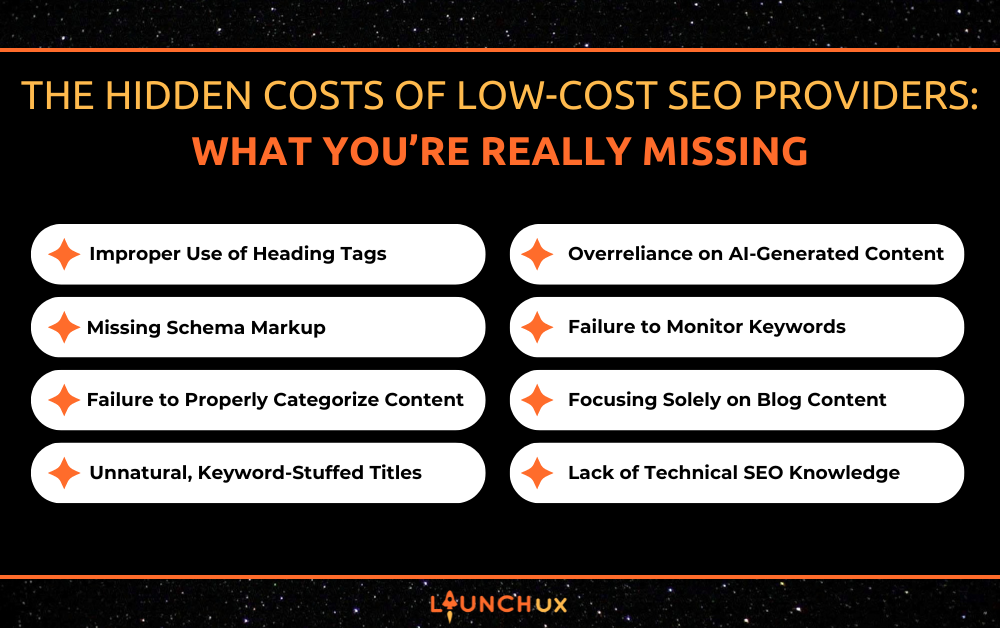At first glance, low-cost SEO services might seem like a smart business move. After all, who doesn’t want better rankings without breaking the bank? But as with most things in business, you often get what you pay for. Budget SEO providers frequently cut corners or lack the knowledge and tools to do the job effectively. This can leave your website underperforming in search results, or worse—flagged by search engines for poor practices.
Here are just 8 critical areas where low-cost SEO services typically fall short—and why these oversights matter to your business.
1. Improper Use of Heading Tags
Search engines don’t read web pages the same way humans do—they rely on structure to interpret what each page is about. Heading tags (H1 through H6) are key to this structure. An H1 tag should introduce the main topic of the page, while H2 and H3 tags break content into organized sections.
Low-cost providers often ignore proper heading hierarchies entirely, either using no headings or misusing multiple H1s. This creates confusion for search engines and can hurt your chances of ranking for relevant queries. Properly used, heading tags not only improve SEO but also enhance readability and accessibility—benefiting both your audience and your rankings.
2. Missing Schema Markup
Schema markup (also known as structured data) is a powerful tool that helps search engines understand the context of your content. It can identify things like products, services, articles, reviews, events, and more. With the right schema, your pages may qualify for rich results in search—like star ratings, FAQs, event info, or product details—which can dramatically increase visibility and click-through rates.
Low-cost SEO providers frequently skip schema implementation because it requires technical knowledge and time. This omission leaves your content less visible in search and undermines its credibility. Without schema, you’re giving competitors an edge and missing opportunities to stand out on the results page.
3. Failure to Properly Categorize Content
SEO isn’t just about what you publish—it’s also about how you organize it. Categories and tags help group content by themes, making your website more navigable for users and more logical for search engines to crawl.
Budget SEO providers often ignore taxonomy altogether, leaving content uncategorized or misfiled. This not only frustrates users but also limits your internal linking structure—an important SEO signal. When content is well-organized, it creates a natural ecosystem of related articles, boosting engagement time and search performance.
4. Unnatural, Keyword-Stuffed Titles
Titles are one of the most important elements for both SEO and user engagement. A good title is clear, relevant, and encourages clicks. Unfortunately, many cheap SEO services take a “more is better” approach and stuff titles with keywords and locations—regardless of whether they fit the context.
For example, a blog titled “Best Plumbing Services in Harrisburg, Mechanicsburg, and Chambersburg” might rank locally, but if the content on the page doesn’t make the title relevant to the content, it can make the page appear misleading or inauthentic. Worse, search engines are smart enough to detect keyword stuffing and may flag it as spammy behavior.
Titles should be written for humans first to ensure relevance, then optimized for search engines. When SEO is done right, it finds the perfect balance.
5. Overreliance on AI-Generated Content Without Human Editing
AI tools like ChatGPT are powerful aids for SEO writing, but they should never replace human insight. Cheap SEO providers often copy and paste AI-generated text directly into blogs without edits or personalization. The result? Generic, robotic content that lacks voice, tone, and relevance.
Good SEO content must reflect your brand, engage your audience, and provide value. It should be tailored, edited, and fact-checked. At LaunchUX, for instance, we use AI to assist—not replace—our human copywriters. This ensures every piece of content sounds natural, reads well, and supports your overall marketing goals.
6. Failure to Monitor Keyword Opportunities
SEO is dynamic. The keywords that perform today may not be the best opportunities tomorrow. That’s why successful SEO requires regular analysis, tracking, and optimization using tools like SEMrush, Ahrefs, or Google Search Console.
Budget SEO firms usually don’t invest in these tools—or the expertise to use them properly. Instead, they take a “set it and forget it” approach, relying on outdated keyword lists or surface-level research. Without consistent monitoring, you’re likely missing out on valuable keyword trends, competitive gaps, and low-hanging fruit that could drive targeted traffic.
7. Focusing Solely on Blog Content
Blogs are an essential part of any content strategy—but they shouldn’t be the only part. A well-rounded SEO plan also includes on-page optimization (like improving title tags, meta descriptions, and internal links), technical site audits, backlink building, and even conversion-focused landing pages.
Cheap providers often offer only blog writing because it’s easy to outsource. But real SEO success comes from a holistic strategy—something you won’t get with a content-only provider. If your SEO firm isn’t looking at your entire site and your funnel, they’re not really doing SEO.
8. Lack of Technical SEO Knowledge
Technical SEO is the foundation of all your other efforts. It includes ensuring your website loads quickly, is mobile-friendly, has a clean URL structure, and doesn’t suffer from crawl errors or broken links. It also involves managing XML sitemaps, canonical tags, and structured data.
Most budget SEO providers don’t even touch technical SEO because it requires a deeper skill set and hands-on access to your website’s backend. Ignoring these details can slow your site down, block it from being indexed properly, or create duplicate content problems—all of which hurt rankings and user experience.
Final Thoughts: Why Professional SEO Is Worth It
SEO isn’t just a task—it’s an ongoing strategy that supports your visibility, credibility, and conversions. While low-cost SEO might look good on paper, the shortcuts they take often leave lasting damage or simply produce no meaningful results.
At LaunchUX, we combine technical precision, strategic planning, and authentic content to create SEO that actually works. We don’t cut corners—we build long-term value.





